
Barriers vs Barricades
Today, barriers and barricades are largely used interchangeably. In reality, they do serve different purposes. A crowd control barricade is intended to physically stop or hinder the flow of pedestrian traffic. Think of protester situations where steel barricades are utilized to keep protestors contained within designated areas. Or barricades used to protect a parade route from pedestrian traffic.
Crowd control barriers, on the other hand, can act as more of a mental barrier. Belt stanchions are a popular form of crowd control barrier that would never hinder anyone from a given area, its more of a way to ask pedestrians to remain orderly and show them how they are intended to act in the crowd.
We will look at a few different types of Crowd Control Barriers in the post and talk about best uses cases for each one.
Request a Quote for Classic Steel Barricades

Steel Barricades
Steel Barricade Fabrication
Steel barricades are crowd control barriers that are commonly used outside. These barricades are manufactured in a variety of styles in a variety of quality.
Common steel barricade fabrication materials:
- Hot dip galvanized steel
- Galvanized plated steel
- Stainless steel
- Aluminum
Hot dip galvanized will provide the best quality barricade.
Standard Steel Barricade Sizes
There is a huge variety in steel barricades on market. There are, however, some commonalities among them. There are three typical sizes of steel barrier:
- 1 Meter
- 2 Meter
- 2.5 meter
While these are the most common sizes, there are some barriers even longer. These are not as popular due to difficulties in handling, storing, and transporting them.

Interlocking Steel Barricades
Virtually every steel barrier manufactured today has some sort of interlocking system. These hooking systems can greatly vary and are not necessarily compatible between various manufacturers. There are three standard hooking styles that are popular:
- Classic Style (male hooks approximately 15 inches apart)
- Wide Hook Style (male hooks approximately 25 inches apart)
- Bent Hand Style
Steel Barricade Bases
Barricade bases are one of the most damaged pieces of the steel barricade. If the base fails and cannot be replaced, the entire barrier is no longer usable. In most situations, it is a good idea to purchase steel barricades with removable bases. Removable bases allow the barrier base to be replaced in cases of damage.
The “legs” of the steel barricade are typically flat or bridge. Bridge bases give you a solid barrier that is more difficult to tip over while flat bases reduce tripping hazards. Either style can be a very effective pedestrian barricade. Some barriers also have removable bases that allow them to be replaced if damaged.



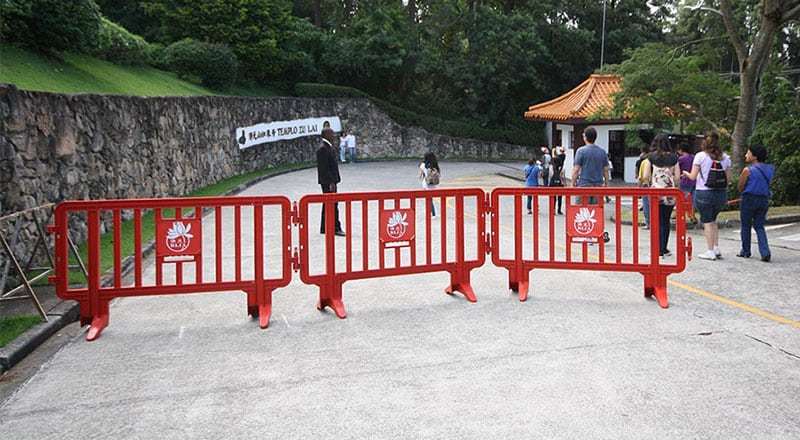
Plastic Pedestrian Barricades
Plastic pedestrian barricades are similar to style and function as the steel barricades with the exception of plastic as the building material: virgin plastic or recycled plastic. Generally speaking, virgin plastic tends to be more durable, but the real strength of the barricade comes in the design of the supports. The ridges you see in these barricades are designed to make them more durable.
Due to their light weight and high visibility, these pedestrian barricades are popularly used around crowds at sporting events, festivals, or situations where a highly visible barrier is preferable to a sturdier, heavier, steel barrier.
Standard Pedestrian Barricade Sizes
Plastic pedestrian barricades typically come in two sizes: 3 feet and 6.5 feet.
These barricades are also manufactured to be easily moved and are stackable- making them easy to store.
Plastic pedestrian barricades are also commonly designed with sign plates on them for large decals ideal for warning signs or logos.
Interlocking Pedestrian Barricades
Plastic pedestrian barricades interlock a bit differently than steel barricades. They have less play in their interlocking mechanism than their steel counterparts. This makes plastic barricades most effective on flat surfaces.
Post and Rope Barriers
Post and rope stanchions are crowd control barriers made from weighted stanchions with some sort of loose rope connecting them. These are generally used in a “Higher Class” venue. These crowd control devices are available in a huge range of prices, styles, and quality.
Popular Post and Rope Rope Styles:
- Plastic Chain
- Velour Rope
- Twisted Rope
- Naugahyde Rope
These rope types are commonly available is a huge assortment of colors.
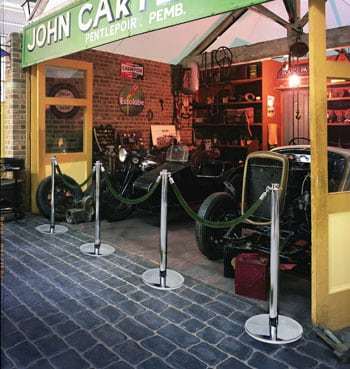
Post and Rope Stanchion Styles and Construction:
Post and rope barrier heights do not vary a great deal (Although a few companies manufacture a low height stanchion for car shows and art galleries). A typical post and rope stanchion will be just over three feet. The height tends to vary based on the ornamental top of the stanchion.
Popular ornamental stanchion tops include:
- Flat Top
- Crown Top
- Ball Top
Stanchion base types include:
- Profile or flat
- Dome
- Fixed
Post and Rope stanchions are available in a broad range of finish types from high shine brass to brushed metal.
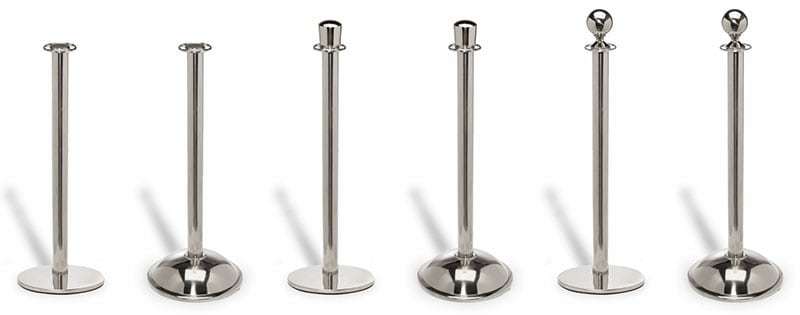
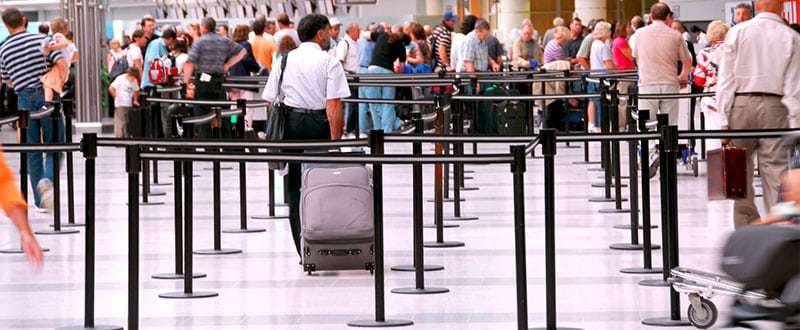
Retractable Belt Stanchions
Retractable belt stanchions are extremely popular in a retail environment. These crowd control barriers are designed to guide customers through a line queue into a checkout process.
Retractable Belt styles include:
- 2.5-inch single belt
- 3-inch single belt
- 6-inch single belt
- 2.5-inch double belt
- 3-inch double belt
- 6-inch double belt
- Roller stanchions
- Weatherized stanchions
How the retractable belt works
The mechanics of a retractable belt lie in the cassette that houses the belt. This spring-loaded cassette will “retract” an extended belt back into the housing for storage or to create a break in a line queue. It’s important to make sure the cassette was manufactured with a braking mechanism to minimize injury from rapidly retracting belts. It’s equally important to test older stanchions to ensure the braking mechanism is not malfunctioning.
Popular Belt Styles
The belt piece of a belt stanchion is available in a huge range of colors, patterns, prints, and lengths. Belts can be custom printed via silk screen or dye-sublimation to convey various types of messages from cautions and
Popular Belt Stanchion Styles and Construction
Similar to Post and Rope Barriers, belt stanchions are available in a broad range of finish and color options.
Unlike post and rope, belt stanchions only have a flat top cassette. There are popular attachments for stanchion tops:
- Sign Inserts
- Flat writing surfaces
- LED signs
- Literature baskets
- Sanitation station tops
- Umbrella stands
Belt stanchions are typically just over 3 feet tall and are manufactured from steel or durable plastic. Bases can be concrete filled tin to cast iron. Some companies manufacture bases with wheels on them to make them easily transportable.
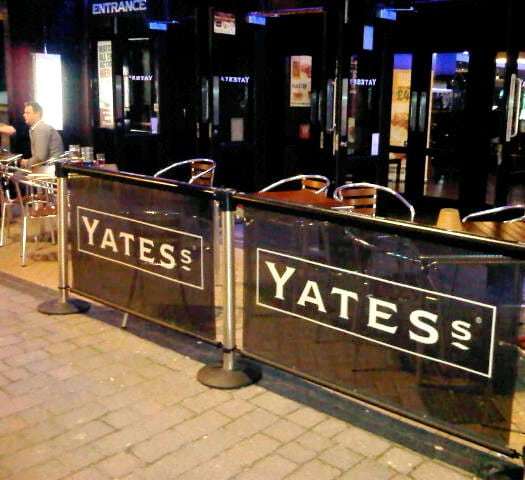
Café Banners
Café banners are a variation of the retractable belt barrier. Café banners typically utilize a horizontal cross member connecting 2 stanchions. The retractable element pulls down rather than across. The screen covers the area between the stanchions and is typically printed on with graphics. This offers a bit more privacy and is popular at cafés with sidewalk seating as a way to create more of a psychological barrier between pedestrians on the street and customers at the table.
Printing on Café banners
In addition to providing privacy for a café’s sidewalk seating, café banners are great for advertisements and to inform potential customers. Since café banners are constantly exposed to the elements, durability is often the main concern when it comes to printing. There are three popular printing methods to choose from:
- Dye sublimation
- Ink jet
- Silk screen
Dye sublimation, a process that uses heat and pressure to transfer dye onto the banner, is ideal for short-term situations because colors tend to fade quicker than other print types. Ink jet printing rapidly deposits droplets of ink onto the material to create an image. Though great for long-term signage, ink jet printed café banners are more prone to scratching and frequent handling. Silk screen printing is usually the best printing method for café banners. Silk screen printed banners have great longevity despite the environment or general wear and tear.
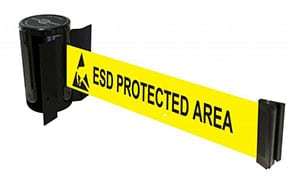
Wall Mounted Retractable Belts
These are similar belt stanchions without the stanchions. Wall mounted retractable belts are secured to a wall or some stationary object to used to close down specific areas. These belt barriers are commonly used in manufacturing and warehouse environments as well has hospitals and power plants.
Stage Barriers
Mojo Barriers invented the stage barrier and it is designed to use the weight of the crowd to keep the barriers from tipping. THere are several manufacturers of stage barriers and they are typically manufactured out of aluminum or steel. These crowd control barriers fold up for simple storage.
There are also build to link together and include corner pieces, angles, and gates.
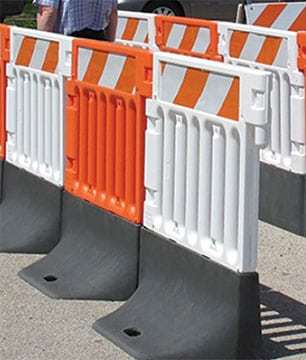
ADA Pedestrian Barriers
ADA pedestrian barriers meet the standards set by the Americans with Disabilities Act. These barriers are completely vertical, eliminating the possibility of having any obstructions along the path they create. ADA barriers also provide a continuous handrail and base, making it easy for pedestrians to navigate the path regardless of their disability.
ADA pedestrian barriers are typically light enough to easily transport, but also heavy and durable enough for high-traffic areas.
